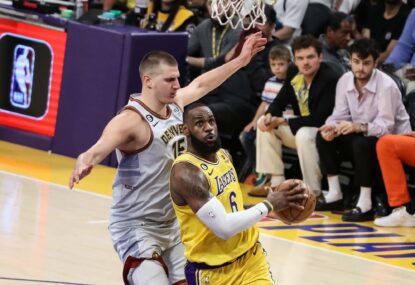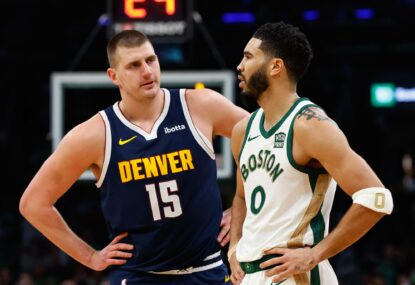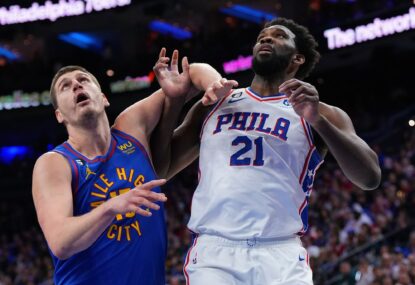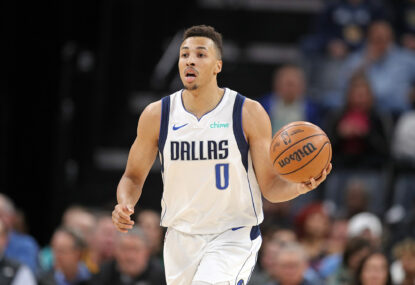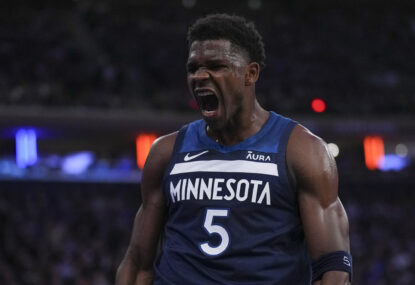We continue with our look at the New Orleans Hornets’ recent turbulent past, from part one last week.
During the lockout, the Hornets undertook a highly ambitious campaign called “I’m In.” Due to not being able to market the players because of the lockout, the Hornets instead marketed the city. They reminded people that New Orleans is a special city and that the Hornets are a big part of its identity and rebuilding process. The idea was that if you’re in for the team, you’re in for the city.
The campaign was unique, ambitious and aggressive. It included a program called “100 events in 100 days”. These events were hosted around the city and at people’s houses. They involved top members of the Hornets’ front office, led by team president Hugh Weber, who got out into the community and connected with thousands of people.
The campaign as a whole was a staggering success. As well the enormous amount of good will achieved, the Hornets sold 4000 season tickets despite the lockout. Hardly anyone else was selling any tickets at all. Not to mention all the uncertainly surrounding whether Chris Paul and the team as a whole would stay. It was an astounding effort with an astounding result.
Hugh Weber, who was recently relieved of his duties so that Tom Benson could implement his own people, was a big part of what made, and makes, the Hornets so special off the court.
He was aware that he would be out of a job when new ownership came in. He knew this for over a year. He could have coasted his way through his final year as the Hornets struggled on court, done the bare minimum and knocked off early each day. Instead, he went above and beyond to ensure the franchise he knew would soon cut him loose would be in the best possible position in the future.
To give you an idea of what Weber is like, he would receive voicemail from concerned and sometimes almost crazed fans about things like trades, and he’d return their calls. The rest of the staff are equally personable and hard working. It’s symbolic of what the Hornets are about, accessibility, connecting with their fans.
The Hornets had a predicably rough season on the court in 2011/12. Not only were they without Chris Paul and David West, but injuries tore the team apart.
The following is the number of games some of the Hornets’ best players missed in this 66-game season.
Eric Gordon – 57
Emeka Okafor – 39
Jason Smith – 26
Trevor Ariza – 25
Carl Landry – 25
Jarrett Jack – 21
Greivis Vasquez – 20
Chris Kaman – 19
This resulted in the Hornets having a total of 22 players suit up for them, in a league where the roster maximum for any one time is 15, including three emergencies who aren’t in uniform on game night.
This included nine temporary players on 10-day or other short-term contracts. Jeff Foote, Solomon Jones, Donald Sloan, DaJuan Summers, Darryl Watkins, Jerome Dyson and a trio of Johnsons – Carldell, Chris and Trey – all suited up and played significant minutes. Most people would never have heard of any of these nine gentlemen.
Not only did the Hornets play 22 players throughout the season, they played 28 different starting line-ups. The Hornets finished last in the west with a record of 21-45, tied with Cleveland for the third-worst record in the league behind Charlotte and Washington.
The Hornets became one of the favourite whipping boys along with the Bobcats for ignorant national media outlets and fans. People looked at the standings and nothing more, forgetting if it wasn’t for injuries the Hornets would have a starting line-up of Jack, Gordon, Ariza, Landry and Okafor with players like Vasquez and Kaman coming off the bench. Instead, they were forced to trot out starting line-ups which almost entirely consisted of young players and D-Leaguers.
Seemingly every week another injury occurred, and whenever someone returned, another bowed out shortly after. I usually hate playing the injury card, but this was just ridiculous. Never before have I seen a team as injury ravaged as the 2011/12 Hornets.
Despite the grim results on court, a multitude of great things started happening off it, resulting in an extremely bright future for the organisation. At the end of the regular season, in April, the Hornets finally got an owner. New Orleans businessman Tom Benson purchased the team for $338 million. Benson beat out a consortium headed by Raj Bhathal, a swimwear manufacturer from LA.
Benson won Stern and the NBA over when he told them he was the only one they could trust to keep the team in New Orleans long-term. Benson is from New Orleans and owns the city’s NFL team, the New Orleans Saints (which, as a matter of fact, he turned from a perennial loser into a Superbowl-winning powerhouse).
There was little to no chance LA-based Raj Bhathal was going to keep the Hornets in New Orleans long term. Benson knew this, and let it be known to Stern.
Benson buying the team also activated a lease agreement which was constructed prior to the sale. The lease included many fantastic elements for the Hornets. There was a deal to keep the team in New Orleans through to 2024, with no escape clauses (so no more attendance benchmarks). There was a $50 million upgrade for New Orleans Arena, and $10m for additional improvements or practice facilities. The lease also resulted in New Orleans being awarded the 2014 NBA-All Star Weekend.
All the uncertainly hanging over the head of the organisation and every fan was suddenly gone. Not only had the negatives been removed, but they’d be replaced with some unexpected positives. This sale and signing of the lease was the turning point for the Hornets.
The good news didn’t stop there. On May 30 2012, at the NBA Draft Lottery, the Hornets won the number one pick despite having a 13.7% chance of doing so. Wild scenes of celebration broke out across New Orleans. Consensus number 1 draft pick and future star Anthony Davis was all but guaranteed to become a Hornet.
It should be noted that instead of being hounded by laughable conspiracy theorists, David Stern should be commended for not only the outstanding job he has done as commissioner and making the NBA what it is today, but also for what he’s done in New Orleans.
Without Stern taking the unprecedented step of buying the team and waiting until a local owner stepped forward, there is absolutely no chance there would still be professional basketball in New Orleans today. He saved basketball in a city where he knew it would flourish once again.
Just one season the Hornets had attendance benchmarks, no owner, no star player, an average roster, limited space to sign free agents, a poor TV deal, a lot of negative media attention, and a strong chance of leaving New Orleans.
A season later, they have two star players in Davis and Gordon, along with the #10 pick, a good young roster, and a great coach in Monty Williams – a man whose teams play hard for him, not to mention with an unbelievable defence. Dell Demps has proven himself to be a very shrewd GM. New owner Benson is a local with a proven track record – just ask New Orleans Saints fans.
The team will stay in New Orleans long term, with an upgraded arena, an All Star weekend, a much improved TV deal, new arena naming rights on the way, 10,000 season ticket holders with more to follow the Davis signing, and a huge amount of cap space freed by Dell Demps to sign major free agents in coming years.
The New Orleans Hornets story is a truly remarkable one. The organisation went through a complete transformation in one season, and now has one of the brightest futures in the league.
Less than 12 months ago, New Orleans fans didn’t even know if the team would be staying in town. Now they now have so much to look forward to.





























































































